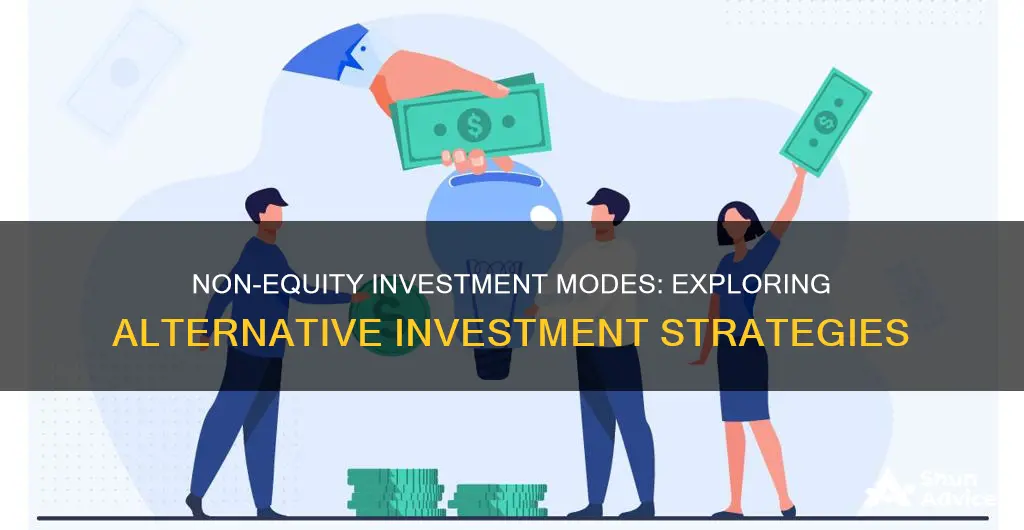
Non-equity modes of investment (NEMs) are contractual agreements that allow foreign investors to enter a new market without contributing capital to start a new business. Instead, they contractually agree to do business with local partners. NEMs are a form of market entry that offers flexibility and ease of access to foreign markets, particularly in countries with established legal frameworks for such agreements. Examples of NEMs include contract manufacturing, services outsourcing, contract farming, franchising, licensing, and management contracts. These arrangements provide benefits such as cost-effectiveness, knowledge transfer, and the ability to tap into local workforces and economies of scale. NEMs differ from equity alliances, such as joint ventures and minority equity stakes, where organisations hold equity in their partners.
| Characteristics | Values |
|---|---|
| Type | Contractual agreements |
| Examples | Outsourcing, long-term supplier relationships, licensing agreements, agency agreements, contract manufacturing, services outsourcing, contract farming, franchising, management contracts |
| Risk | Low risk |
| Control | No equity in other partners but can influence their actions |

Contract manufacturing
This arrangement offers several benefits to the foreign investor. Firstly, it allows them to save costs by leveraging the local workforce and economies of scale in the host country, avoiding the need to set up a new factory or purchase equipment. Secondly, contract manufacturing provides foreign investors with a flexible and low-risk entry into a new market, as they can enter into contractual agreements without the need to establish a separate business entity. This ease of market entry is particularly advantageous for investors in the early stages of market expansion, as it eliminates substantial upfront costs and commitments.
For the host country, contract manufacturing also brings significant advantages. It creates job opportunities, generates substantial export profits, and facilitates knowledge transfer. According to the UNCTAD report, an estimated 18-21 million people worldwide work in NEMs, with contract manufacturing being one of the most prevalent forms. Additionally, contract manufacturing enables the host country to strengthen its local economy, particularly in terms of jobs, GDP, exports, and technological development, allowing for deeper and more effective participation in global value chains.
In summary, contract manufacturing, as a form of NEM, offers a flexible and cost-effective approach for foreign investors while also driving economic growth and creating mutual benefits for the host country.
Invest Your Savings Wisely: A Guide for Nigerians
You may want to see also

Service outsourcing
For example, a foreign fast-food chain may enter a service outsourcing agreement with a local firm to provide delivery services within a specific region. The local firm would then hire delivery drivers and manage the logistics of deliveries, without the foreign company needing to establish a separate business entity.
In addition to service outsourcing, MNCs may also engage in other forms of non-equity alliances, such as long-term supplier relationships, licensing agreements, and agency agreements. These arrangements allow the MNC to influence the actions of local partners without holding any equity in those partners' businesses.
Debt Investment in India: Understanding the Basics
You may want to see also

Contract farming
In the context of contract farming, the international buyer enters into a contract with local farmers, agreeing on specific conditions for agricultural production. These conditions can include specifications for farming practices, harvesting techniques, and marketing strategies. The contract may also outline the terms of business cooperation, profit-sharing, and product co-distribution between the buyer and the farmers.
One of the key advantages of contract farming, as a NEM, is that it provides a more flexible and less costly alternative to traditional greenfield and brownfield investments. By partnering with local farmers, international buyers can leverage cost-effective local workforces and benefit from economies of scale. Additionally, they can avoid the substantial upfront costs and commitments associated with establishing new farming operations in a foreign market.
In summary, contract farming, as a non-equity mode of investment, offers a mutually beneficial arrangement for international buyers and host-country farmers. It enables buyers to enter new markets with reduced risk and cost while providing local farmers with access to resources and expertise that can improve their productivity and global reach.
Understanding Diverse Investment Portfolio Types and Their Benefits
You may want to see also

Franchising
A well-known example of franchising is the global fast-food chain KFC. The franchisee benefits from a standardised and globally recognised brand and system that have been proven to generate profits. At the same time, the franchisor enjoys a stable and continuous stream of profits due to the long-term nature of franchising contracts.
Compared to licensing, another form of non-equity mode, franchising agreements tend to be longer and offer a broader package of rights and resources. This typically includes equipment, managerial systems, operation manuals, initial training, site approval, and ongoing support. While licensing involves intellectual property and trade secrets, franchising is usually limited to trademarks and operating know-how.
However, franchising also has some disadvantages. Maintaining control over the franchisee and ensuring consistent product quality across locations can be challenging for the franchisor. Additionally, conflicts and legal disputes may arise between the two parties.
Overall, franchising is a non-equity mode of investment that allows companies to expand their operations and presence in new markets while minimising risk and upfront investment. It is a popular strategy for companies looking to internationalise their operations, particularly those with limited international experience.
Unlocking the Power of Savings and Investments
You may want to see also

Licensing
In this agreement, the licensor, usually a foreign investor, grants the licensee permission to use their products, services, brand, and/or technology in a specified market. This agreement allows the licensor to expand their business into a new market without having to establish a new operation overseas. The licensee benefits by gaining access to the licensor's competitive advantages, unique assets, and established brand without investing heavily in research and development.
However, licensing also presents some disadvantages, such as lower income compared to other entry modes and potential loss of control over the licensee's manufacturing and marketing practices, which may lead to a loss of quality. There is also a risk of trademark and reputation damage if the licensee is incompetent or becomes a competitor.
India's Best Investment Opportunities: Where to Invest Now
You may want to see also
Frequently asked questions
Examples of non-equity modes of investment (NEMs) include contract manufacturing, services outsourcing, contract farming, franchising, licensing, and management contracts.
NEMs offer a higher degree of flexibility to investors, allowing them to enter new markets without the need for substantial upfront costs and commitment. They also enable investors to leverage economic arbitrages, save on setup costs, and access new markets at a low risk and cost.
Non-equity modes of investment differ from equity modes in terms of the degree of risk they present, the control and commitment of resources they require, and the return on investment they promise. Equity modes, such as joint ventures and wholly owned subsidiaries, typically involve greater financial commitment and control, while non-equity modes focus on contractual agreements and flexibility.







